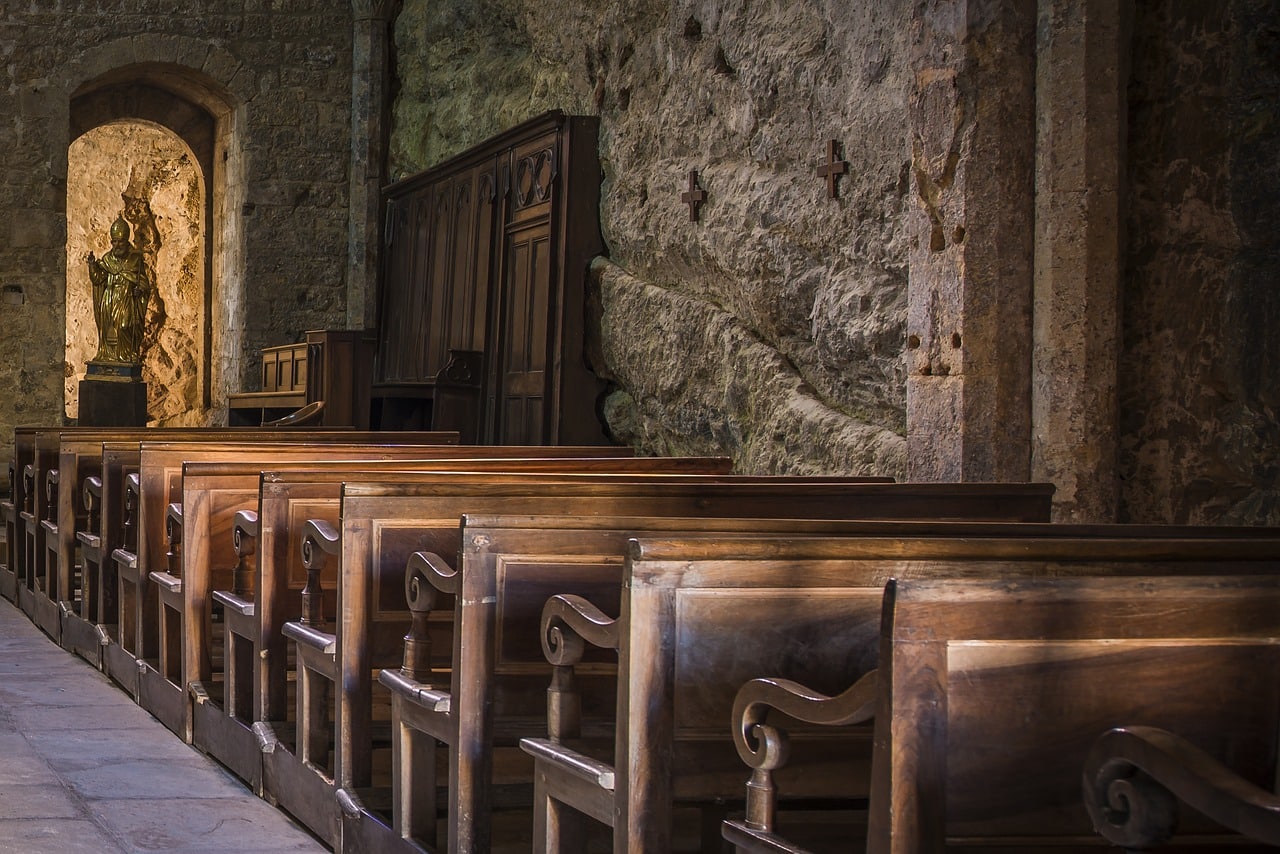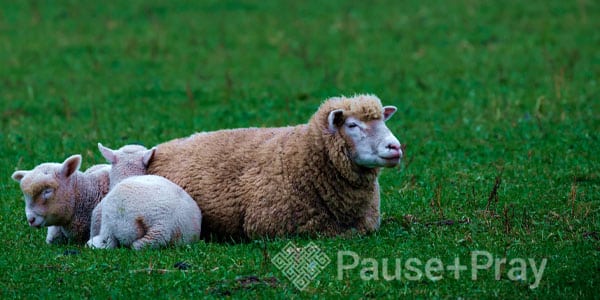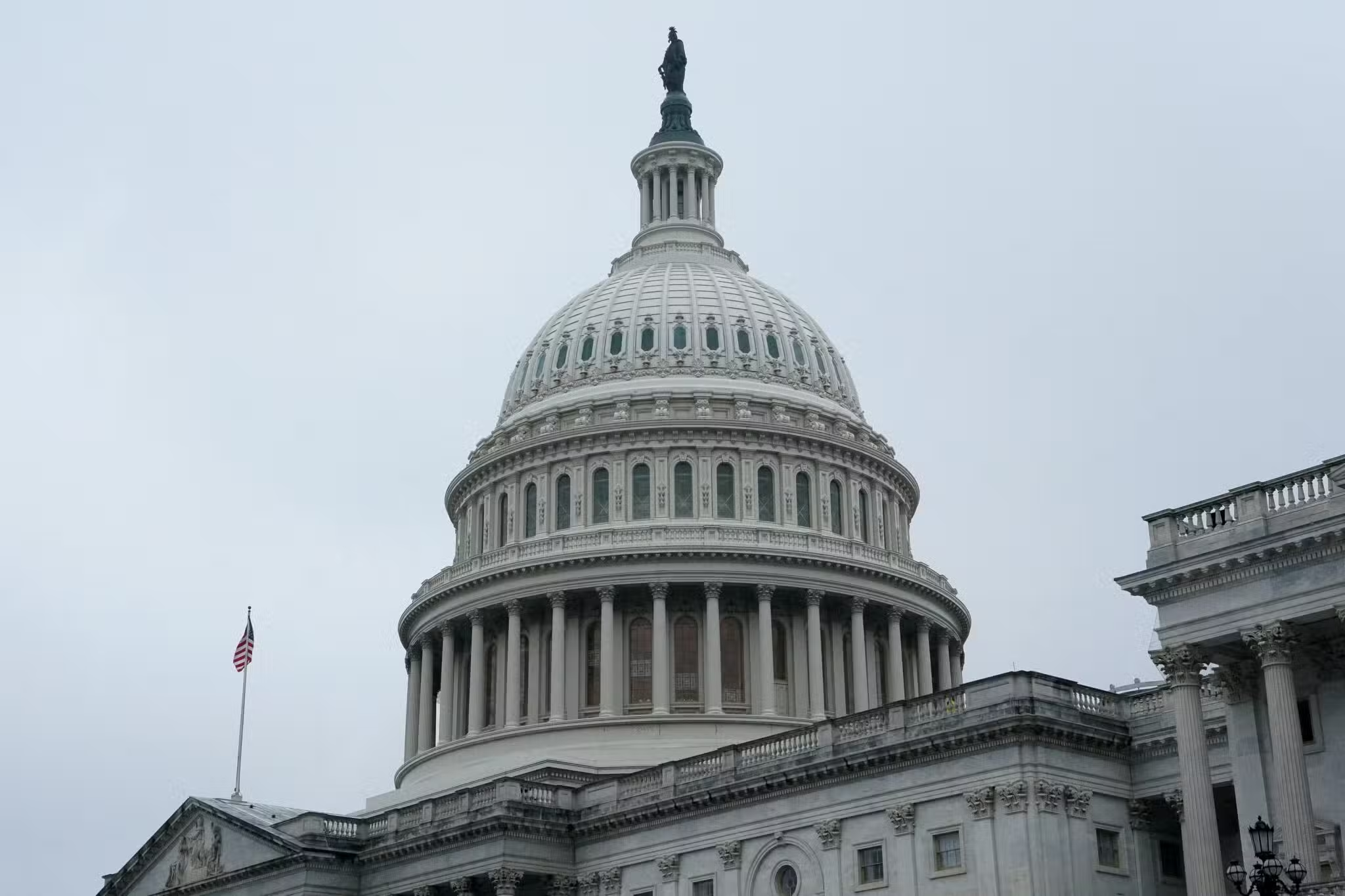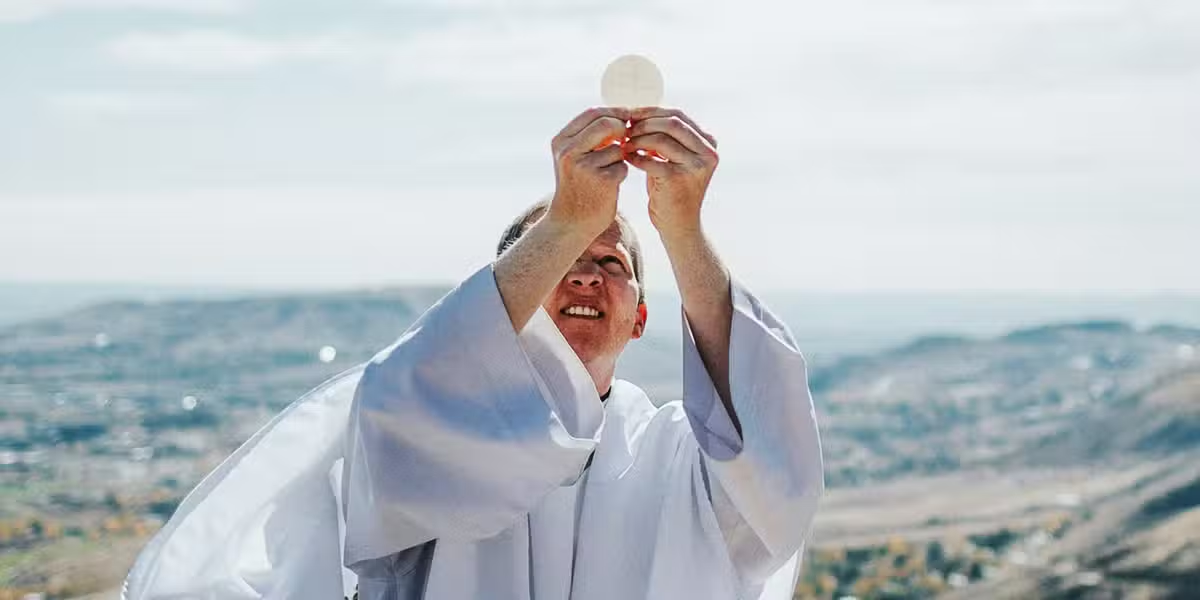A Mass without Borders
Maria Lira found herself crying uncontrollably twice in the same week. It was, she says, the kind of crying that you don’t feel coming and is hard to stop.
The first time the tears came she was on a bridge linking Mexico and Texas. She and other immigrant advocates had made their way to the border crossing to offer a symbolic gesture—tying blue ribbons to the surrounding fence—and to pray for and recall the thousands of people who have died trying to make their way into the United States.
The second time, she sat in an unlikely place straining to listen to Pope Francis give a homily. “We were so far away. I was trying so hard to hear him,” she says.
Lira, a nurse by training and a domestic worker by choice, was seated on a narrow gravel levee just north of the Rio Grande in El Paso, Texas. Sandwiched between chainlink border fences, she was among 550 invited guests taking part in the papal liturgy being celebrated across the way in Ciudad Juarez, Mexico.
“All I heard was one word, the word exploitation, and I started to cry like nothing again,” Lira recalls. “Very deep in my heart I was experiencing what people feel when another person is being exploited—like immigrants who are taken advantage of, or taken in as slaves, or the way people die crossing the border.”
The pope was speaking about injustice and oppression, saying that transformation and conversion come with “tears that purify our gaze and enable us to see the cycle of sin.” He had come to the border at the end of his sixday pastoral visit to Mexico. In solidarity with migrants, he appealed for mercy for those forced to leave their homeland, “expelled by poverty and violence, by drug trafficking and criminal organizations.”
In his homily, he cried out, “No more death! No more exploitation!”
The group of immigrants, refugees, migrant workers, El Paso barrio residents, and other “Pope Francis VIPs,” as the Diocese of El Paso called them, took part in the Mass in a zone secured by dozens of Border Patrol and other officers. The ground was dry and devoid of life. Even the river, tamed by cement walls at this juncture, was brown and still. Every dozen feet or so along the fence, a yellow sign warned, “DO NOT TRESPASS.”
It was an unusual place for Mass, yet no one seemed too uncomfortable, even with a hot sun and barbed wire looming overhead. Although the sounds coming from Juarez were muffled by distance, those on the El Paso side followed the service with Mass booklets, took part in Communion, and joined the celebration in song.
“What brought me there was my love. I am Catholic. I love God. I love the Church. I love people,” Lira says. “I felt I had the responsibility and the obligation to be there for my brothers and sisters, to love and support immigrants and their families.”
Experiencing Discrimination Firsthand
Born and raised in Nuevo Laredo, Mexico, Lira is no stranger to the border area or family separation. “I am a border-town girl,” she says.
At the age of 21, she left her home in Mexico and came to the United States. She wanted to be with her sister, who was ill at the time and living in Houston. Lira had lawful permanent residency in the United States, but that did not guarantee how she was treated once she was in Houston. “I suffered discrimination and abuse that many immigrants suffer simply because I was Hispanic.”
Lira says she took on some of her sister’s housekeeping clients so her sister could recuperate and rest. “I worked hard for 10 hours cleaning a house and was paid very little. I hadn’t experienced low wages; I was a nurse,” she says. “I questioned the payment and was told, ‘If you don’t like it, you don’t have to come back.’ They thought I was an illegal immigrant and could take advantage of me. People made that assumption a lot.”
Because Lira wasn’t afraid to speak out for herself, she was able to negotiate a more just payment for the work she and her sister were doing. To this day, Lira works to raise consciousness about problems faced by low-wage earners through the Fe y Justicia Worker Center in Houston.
She says the growing anti-immigrant sentiment in the United States makes her want to do even more. “We are experiencing a lot of hurt, and it’s getting worse.” The pope’s words, she says, give her encouragement to tell the immigrant story and to continue her advocacy.
“It was important for me to be at the border and be united with him and his message of love. . . . He’s a moral leader. I’m very connected with him. He knows the people and can defend their rights. He’s a people’s pope.”
The Power of Pope Francis’ Presence
This simpatico relationship was felt by many peering through the border fence that day in mid-February. As a son of immigrants, Pope Francis has displayed a unique connection to migrants and has made their plight one of his top priorities. He has encouraged those inside and outside the Church to look after migrants with charity and tenderness.
“¡Se ve, se siente, el papa está presente!” (“He is seen, he is felt, the pope is present!”)
The chanting from the El Paso crowd could be heard on the Mexico side as the pope arrived for Mass. Before vesting, he walked up a platform to a large cross overlooking the Rio Grande. He stopped for a few moments, bowed his head in prayer, placed flowers at the foot of the cross, and then turned to bless the people beyond the fence.
Lily Limon, the daughter of Mexican immigrants and an El Paso City Council member, fell silent when the pope began to pray. She stood with her hand over her heart on the verge of tears. When the pope disappeared from sight, Limon let her thoughts flow.
“To know that he was this close to us, and he took time to bless and look over to us, to the VIPs seated here—our immigrants, our young people that have crossed over undocumented, our migrant workers . . .” She stopped to take a breath. “This is just an incredible gesture and, for us, an unforgettable experience.”
One group of undocumented, unaccompanied youths on the levee was easy to spot. Boys and girls from Latin America who arrived in the United States without parents or other adult guardians had on bright orange T-shirts emblazoned with a line drawing of the pope. Detained by US immigration officials, they were living in shelters in the El Paso area until their status could be resolved or they could be connected with family members.
The media present were warned not to show the youths’ faces or take their names, because they are minors without guardians. This veil of protection makes them somewhat invisible to much of the world. One of the girls told Catholic News Service that she fled to the United States from Tijuana, Mexico, after her friends were shot by gang members.
Retired Los Angles Cardinal Roger M. Mahony—a longtime advocate for immigrants, who decades ago sat with labor leader Cesar Chavez defending the rights of migrant workers— took part in the historic “liturgy of two nations.” He said he had the opportunity to be at the altar with Pope Francis in Juarez, but chose instead to be in El Paso with the migrants.
“I wanted to be here on this side because most of these people can’t go to the other side,” he said. “I have hope and longing that someday it will be a lot easier for us to be brothers and sisters across borders.”
The cardinal called Pope Francis a unifying force at a time when other leaders are touting isolationism and the raising of walls. “He’s really showing us the unity among peoples, that in God’s kingdom there are not borders or barriers or walls. His presence here is a powerful sign that the unity of all peoples is the ultimate path to peace in the world.”
One Immigrant’s Chilling Tale
Carlos Gutierrez, his artificial legs stretched before him, sat on the levee not far from where Cardinal Mahony and other bishops were seated. Days before the pope’s arrival, his story was broadcast around the globe by CNN.
Gutierrez, a successful businessman in Chihuahua, Mexico, was compelled to make extortion payments to crooked police until he could no longer afford to keep paying. In 2011, the officers found him at a park, hacked off his legs in broad daylight, and then threatened to kill his sons if he didn’t continue to give them money. After his release from the hospital, Gutierrez and his family fled to the United States seeking asylum.
Although the United States has yet to grant all members of his family asylum, Gutierrez says the horrible events of the past have changed his life for the good.
“God thought it was [better] for me to live without legs than for my family not to be alive today,” he told CNN.
“The human tragedy that is forced migration is a global phenomenon,” Pope Francis said before Gutierrez and the rest of his audience in Juarez and El Paso.
Staggering Numbers
There are plenty of statistics on global migration, but a few pretty much sum up the situation.
According to the United Nations, 244 million people—3.3 percent of the world’s population— lived outside their country of origin in 2015. One quarter of the migrant population had been displaced by conflict or persecution. With 47 million, the United States hosts the largest number of international migrants.
Pope Francis urged people not to take stock of the crisis, though, by only looking at numbers.
“We want instead to measure [it] with names, stories, families,” he said. “Let us say together in response to the suffering on so many faces: in your compassion and mercy, Lord, have pity on us. . . . Cleanse us from our sins and create in us a pure heart, a new spirit.”
Face of the Crisis
Two days before the Juarez Mass, one of the faces of the crisis was walking the same bridge that Maria Lira had stood on crying. Diana Martinez was asking people crossing the border for any change they might spare.
“I am from Chiapas, and just got deported,” Martinez told a reporter midway on the Paso del Norte bridge linking El Paso and Juarez. “I don’t want to try anymore,” she said. “Just want to go home.”
The petite young woman offered little expression as she spoke. She looked tired and worn and was brief in telling about the months it took her to make it across Mexico and into the United States, and about the several times she had been deported. She did not reveal her reasons for leaving Chiapas, but those are not difficult to imagine; the state is among Mexico’s poorest and the indigenous population there suffers from exclusion and exploitation.
Martinez said she knew Pope Francis was in Mexico, but that seemed to have little value for her situation. She was hoping to collect enough money for transportation to go back to her hometown.
“I don’t know how I’ll get there. Praying to God is what I can only think of.”
After the brief chat with the journalist, Martinez turned and walked back down the bridge. She stopped short of the point where a US Border Patrol agent stood and she solicited another border crosser for change.








